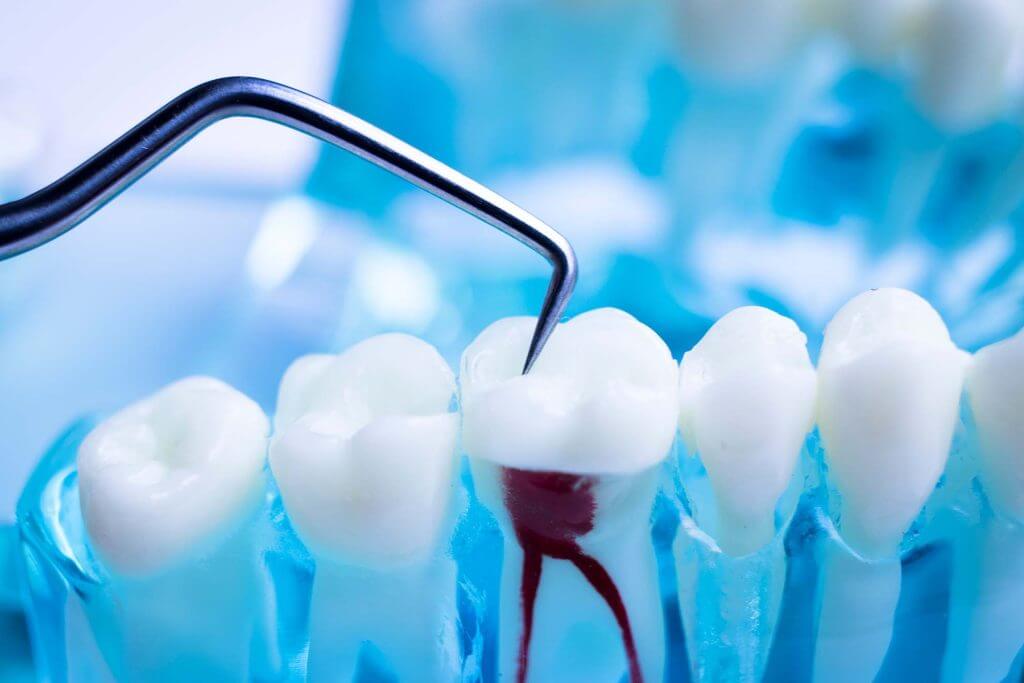ROOT CANAL


Save your tooth & fix the pain!
A root canal treatment is a dental procedure planned to clean out tooth decay and remove any bacteria from the infected root canal. It is also used to curb the reocurrence of tooth infections and maintain the tooth’s natural state.
What to expect during a Root Canal treatment?
Step 1
We will start to numb the area around the infected tooth using a local anaesthetic, making it as comfortable and pain-free as possible. This method should be painless and no more unpleasant than having a filling.
Step 2
The infected tissue will be removed from the tooth canal and cleaned. The remaining tooth structure will then be sealed and filled.
Step 3
Your root canal will be completed by bonding a crown onto your tooth. The inflammatory tissue close to the tooth will often recover naturally.
Root canal treatment is designed to eliminate bacteria from the infected root canal, prevent reinfection of the tooth and save the natural tooth. When one undergoes a root canal, the inflamed or infected pulp is removed, the inside of the tooth is carefully cleaned and disinfected, then filled and sealed. Why is a root canal necessary? A root canal treatment becomes necessary when the pulp, the innermost layer of the tooth containing nerves, blood vessels, and connective tissue, becomes infected or inflamed. This infection or inflammation can occur for various reasons, including deep decay, repeated dental procedures on the tooth, a cracked or fractured tooth, or trauma to the tooth. If left untreated, the infection can spread to the surrounding tissues, leading to severe pain, abscess formation, and, eventually, tooth loss. Root canal treatment aims to remove the infected or inflamed pulp, clean and disinfect the root canal system, and seal the space to prevent further infection. By preserving the natural tooth structure, a root canal procedure helps alleviate pain, restore oral health, and prevent the need for tooth extraction.
Several signs may indicate the need for a root canal treatment. These include:
Persistent Tooth Pain: Persistent or severe tooth pain, especially when chewing or applying pressure to the tooth can indicate an infection or inflammation in the tooth pulp.
Sensitivity to Temperature: Increased sensitivity to hot or cold temperatures, which persists even after the stimulus is removed, may signal nerve damage or infection within the tooth.
Gum Swelling: Swelling or tenderness in the gums near the affected tooth can occur due to the spread of infection from the tooth root.
Discolouration of the Tooth: Darkening or discolouration of the tooth, mainly if it appears grey or black compared to the surrounding teeth, may indicate nerve damage or decay inside the tooth.
Prolonged Sensitivity: Lingering sensitivity to sweets or pressure on the tooth, lasting more than a few seconds, can be a sign of nerve damage or infection.
Gum Pimples or Abscess: The formation of a pimple or small, pimple-like bump on the gums, often accompanied by drainage of pus, can indicate an abscess or infection at the tooth’s root.
Loose Tooth: A loosening or shifting of the affected tooth, mainly if it occurs without trauma or injury, may indicate underlying issues with the tooth’s root.
If you experience any of these signs or symptoms, you must consult with your dentist promptly for an evaluation. Early detection and treatment of dental issues can help prevent further complications and preserve the natural tooth structure.
Root-filled teeth are weaker and more brittle than non-root-filled teeth. For this reason, restoring the root-filled tooth with a crown or on lay is often advisable to reinforce the tooth. We would typically wait a few months after treatment to ensure that the root canal treatment is OK before assessing whether crowning is advisable.
The duration of a root canal procedure can vary depending on several factors, including the complexity of the tooth’s anatomy, the severity of the infection or inflammation, and the individual patient’s dental health.
On average, a root canal treatment typically takes one to two hours per tooth. The dentist or endodontist will first administer local anaesthesia to ensure the patient’s comfort during the procedure.
Then, they will access the inside of the tooth by creating a small opening in the crown and removing the infected or inflamed pulp tissue.
Next, the dentist will thoroughly clean and disinfect the root canal system to remove any bacteria or debris. They may use specialised instruments and irrigants to flush out the canals and ensure they are infection-free.
Once the root canal system is cleaned and shaped, the dentist will fill the space with a biocompatible gutta-percha material to seal the canals and prevent further infection. Sometimes, a temporary filling may be placed to protect the tooth until a permanent restoration, such as a dental crown, can be identified.
The final step of the procedure involves restoring the tooth’s structure and function with a permanent restoration, such as a dental crown, to protect and strengthen the tooth.
Overall, while the duration of a root canal procedure may vary depending on the specific circumstances, most treatments can be completed in one or two appointments, allowing patients to return to their normal activities relatively quickly.
The recovery process after a root canal procedure is usually straightforward, and most patients can resume their normal activities shortly after the treatment. Here is what you can expect during the recovery period:
Minimal Discomfort: It is normal to experience some discomfort or sensitivity in the treated tooth and surrounding gums for a few days following the root canal procedure. Over-the-counter pain medications, such as ibuprofen or acetaminophen, can help alleviate any discomfort. Your dentist may also prescribe pain medication if needed.
Avoid Chewing on the Treated Tooth: To allow the tooth to heal properly, it is advisable to avoid chewing on hard or sticky foods with the treated tooth immediately after the root canal procedure. Opt for softer foods and avoid biting down directly on the treated tooth until it has fully healed.
Maintain Good Oral Hygiene: Continue to brush and floss your teeth regularly, taking care to avoid the treated tooth initially. Your dentist may recommend using a soft-bristled toothbrush and gentle brushing techniques to minimise irritation to the treated area.
Follow-up Appointments: Attend any follow-up appointments scheduled by your dentist to monitor the healing process and ensure the treated tooth is functioning properly. During these appointments, your dentist may evaluate the tooth’s condition and discuss any further treatment options, such as a permanent restoration like a dental crown.
Watch for Signs of Infection: While it is rare, complications such as infection or swelling can occur after a root canal procedure. Watch for signs of infection, including persistent pain, swelling, or discharge from the treated tooth, and contact your dentist if you experience any of these symptoms.
Overall, the recovery process after a root canal procedure is typically smooth, and most patients experience relief from any pain or discomfort they were experiencing before the treatment. By following your dentist’s post-operative instructions and practising good oral hygiene, you can help ensure a successful outcome and maintain the health of your treated tooth for years to come.

Aftercare for a Root Canal Treatment
Meon Dental prioritises your oral health and well-being even after your Root Canal procedure. The essential aftercare is crucial to maintaining good oral health and prolonging the longevity of your teeth.
We have prepared a comprehensive aftercare guide to assist you. Click here to see the Root Canal aftercare guide:





